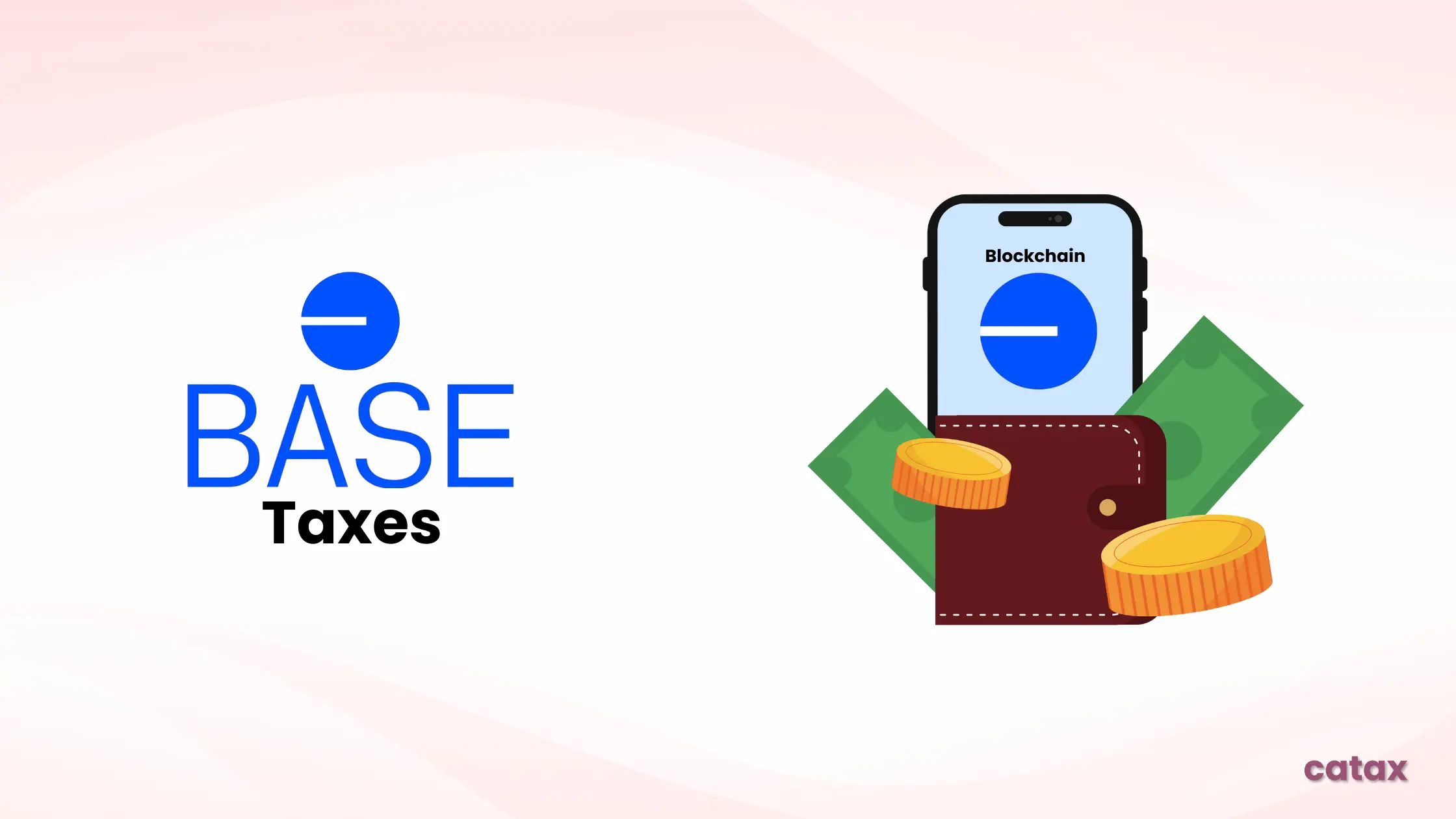Cryptocurrency tax rules vary from country to country, and Base (BASE) transactions may be taxed differently depending on local regulations. Whether you buy, sell, trade, or stake BASE, it’s important to understand how tax authorities classify these activities and what your taxes responsibilities are.
This guide breaks down Base taxes in simple terms so you can stay compliant and make informed financial decisions.

How to Connect Your Base Wallet to Catax?
If you want to track your Base (BASE) transactions and calculate taxes efficiently, you can connect your wallet to Catax by following these steps:
- Open your Base wallet or block explorer (such as Trust Wallet, Ledger, MetaMask, or any other supported wallet).
- Find and copy your public wallet address.
On Catax:
- Log in to catax.app and select your country.
- Select Chain, then search for Base Wallet.
- Paste your public address and click Connect.
Once connected, Catax automatically tracks your BASE transactions and simplifies tax calculations.
Calculate My Taxes ➤Are Base (BASE) Transactions Taxable?
Yes, in most countries, Base transactions are taxable. Governments classify BASE as a capital asset, property, or income, depending on how you use it.
Taxable Base Transactions
Tax authorities generally consider the following activities taxable:
- Selling BASE for a profit – If you sell Base at a higher price than what you paid, the profit is subject to capital gains tax.
- Trading BASE for another cryptocurrency – Exchanging Base for Bitcoin, Ethereum, or any other crypto may create a taxable event.
- Using BASE to buy goods or services – Spending Base can trigger capital gains tax if its value has increased since you bought it.
- Earning BASE from staking – Many countries tax staking rewards as income when received.
- Receiving BASE as payment – If you are paid in Base for work or services, it is typically taxable income, based on its market value at the time of receipt.
Since tax laws vary by country, it is important to check how Base transactions are taxed in your region to ensure compliance.
Can You Deduct Trading Fees and Other Costs?
Many Base traders ask whether they can deduct trading fees, transaction costs, and security expenses from their taxable income. This depends on local tax laws.
Some countries allow deductions for:
- Exchange trading fees paid when buying or selling BASE.
- Transaction (network) fees paid for sending BASE from one wallet to another.
- Security and custody costs, such as hardware wallets, private key storage, and multi-signature protection.
Other countries only allow deductions for the cost of acquiring Base, meaning you can subtract the original purchase price from the selling price but not additional fees like exchange fees or transfer costs.
To avoid mistakes, check your country’s tax regulations to determine what deductions you can claim.
How Is Base (BASE) Taxed Based on Holding Period?
Your tax rate on Base profits may depend on how long you hold BASE before selling it. Most governments use one of the following approaches:
- Short-term holdings (less than a year) – Many countries tax short-term gains at a higher rate, similar to income tax brackets.
- Long-term holdings (more than a year) – Some governments offer lower tax rates for long-term crypto investments to encourage holding digital assets.
- Flat tax rates – A few jurisdictions apply a fixed tax rate on all cryptocurrency gains, regardless of the holding period.
Understanding your country’s tax rules for short-term vs. long-term holdings can help you plan your tax payments more effectively.
You can also check out our Country-Specific Guide for Crypto your country. This guide provides insights on regulations, tax implications, and compliance measures breifly explained for each country.
How Is Staking Income Taxed?
Base staking rewards provide passive income for holders, but they are taxed differently in different jurisdictions. Some governments tax staking rewards immediately, while others only tax them when they are sold or exchanged. How different countries tax staking income
- Taxed as income – Some countries consider staking rewards as earned income, meaning you owe taxes as soon as you receive them. These rewards are taxed at your standard income tax rate, similar to wages or freelance earnings.
- Taxed as capital gains – Other countries only apply tax when you sell or exchange the staked tokens. In this case, the amount you originally received is not taxed, but any profit from selling it later is.
If you stake Base, knowing when your tax liability begins can help you avoid unexpected tax bills. If your country taxes staking rewards as income, you may owe taxes even if you haven’t sold your rewards yet.
To prevent unexpected tax liabilities, check how staking rewards are taxed in your region before participating in Base staking programs.
Can You Claim Base Losses for Tax Benefits?
Not every Base trade results in a profit, and selling BASE at a loss might help reduce your tax bill. How Different Countries Handle Crypto Losses
- Loss offsets – Some countries allow Base losses to reduce taxable profits, meaning you only pay taxes on net earnings.
- Loss carryforward – If you have no capital gains in the same year, some countries let you carry forward losses to offset profits in future years.
- Limited deductions – Some governments do not allow cryptocurrency loss deductions, meaning losses cannot reduce tax liabilities.
Keeping detailed transaction records ensures that you can accurately report losses and maximize any tax benefits available in your country.
How to Stay Compliant with Base (BASE) Tax Regulations?
As cryptocurrency tax laws become stricter, ensuring compliance is more important than ever. To avoid penalties and legal issues:
- Understand how your country taxes Base transactions – Are gains taxed as capital gains, income, or business revenue?
- Determine if you can deduct trading fees, staking rewards, and other costs – Different countries have different rules on deductions.
- Maintain detailed records of every Base (BASE) transaction – This includes buying, selling, trading, staking, and spending BASE.
- Use a crypto tax tool like Catax – Catax automates tax calculations, making it easier to track taxable events and file tax returns accurately.
- Consult a tax expert if necessary – If you are unsure about your tax obligations, professional tax advice can help you stay compliant with local laws.


